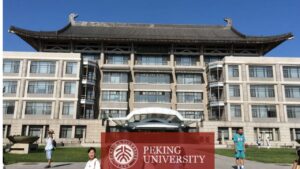Foreign Biotech Companies Expand in China

Shanghai, The Gulf Observer: Insilico Medicine, a leading global AI-driven biotech firm, has significantly condensed the timeline for preclinical drug development to just 18 months, thanks to its research and development team in Shanghai. This breakthrough exemplifies China’s growing role as a hub for biopharmaceutical innovation.
“Shanghai is our first choice to design new medicine, as it’s the center of biopharmaceutical innovation,” said Alex Zhavoronkov, founder and CEO of Insilico. “What’s more, there are so many contract research organizations, talent, and vibrant communities.”
Founded in New York and Hong Kong, Insilico established its Shanghai drug research and development center in 2019. Today, it stands as the company’s largest and most talent-intensive center globally, reflecting Shanghai’s pivotal role in the firm’s strategy.
Insilico Medicine is among numerous foreign enterprises increasing their investments in China, attracted by the broad market opportunities and the potential for collaboration in advanced, high-quality productivity sectors. These new quality productive forces, characterized by high-tech, efficiency, and quality, are reshaping traditional economic growth and development models.
In the first seven months of 2024, China saw a substantial influx of foreign investment in high-tech manufacturing, totaling 69.58 billion yuan (approximately 9.75 billion U.S. dollars), accounting for 12.9 percent of the nation’s total foreign capital utilization. This marks a 2.6 percentage point increase from the previous year.
Sectors such as medical instruments, technical services, and computer and office facilities manufacturing experienced significant growth in foreign direct investment, with increases of 87 percent, 41.3 percent, and 32.4 percent, respectively.
China’s commitment to green development is also driving foreign companies to embrace ecological transformation. Danfoss, a Danish energy efficiency solutions company, has achieved 100 percent green energy usage at its Tianjin factory, aiming to cut 28,000 tonnes of carbon emissions annually. Airbus’ Tianjin campus has reduced nearly 2,500 tonnes of carbon dioxide emissions this year through green electricity.
According to the Ministry of Industry and Information Technology, China is fostering 5,095 green factories, 371 green industry parks, 605 supply chain management enterprises, and approximately 35,000 green products, underscoring the nation’s shift towards sustainable industrial practices.
“The cultivation of new quality productive forces provides broad market opportunities and new growth points,” said Xiao Song, President and CEO of Siemens China. He added that Siemens is combining digitalization with low-carbon trends to achieve high-quality development.
China continues to intensify its efforts to attract foreign firms and expand high-level opening-up policies. The State Council’s recent executive meeting approved the 2024 edition of the negative list for foreign investment access, further relaxing restrictions in the manufacturing sector and accelerating the opening up of industries such as telecommunications, education, and healthcare services.
“The dynamism of the Chinese market, coupled with the government’s efforts to expand domestic demand and attract foreign investment, provides us with a broader space for development,” said Tao Lin, Vice President of Tesla.
China’s ongoing reforms and its commitment to high-quality, sustainable growth are positioning the nation as an increasingly attractive destination for foreign investment, particularly in high-tech and green industries.


